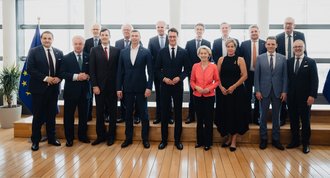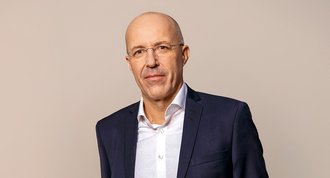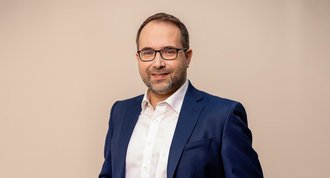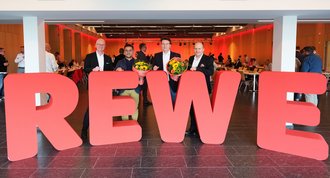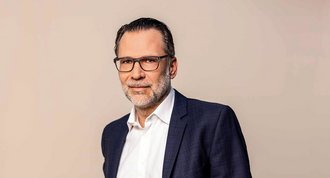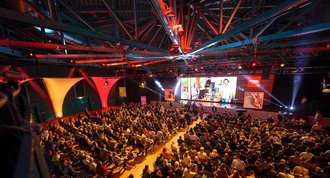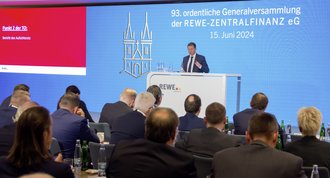
Telerik Shishmanov, REWE Group's new Chief Financial Officer (CFO), explains why it is important to continue investing heavily, the challenges involved and why diversity should not necessarily apply to shopping trolleys.
one: Mr Schischmanow, you got to know REWE Group in various functions and from different perspectives before you took on the role of CFO on 1 July 2022 in addition to your function as Divisional Director Retail Germany. Does that mean you didn't need long to familiarise yourself?
Telerik Shishmanov: That's right, I've known most of the topics, processes and colleagues for a long time. I started at REWE Group in 2006 as Head of Investment Management / Mergers & Acquisitions and got to know both the breadth and depth of the Group over the following years. I am now a managing director, Management Board member, Supervisory Board member, Advisory Board member or shareholder representative in around 150 companies - so there is hardly a topic that I am not involved in. So I feel very well prepared. On the other hand, my other colleagues on the Executive Board and all employees know what to expect from the newcomer. Especially in challenging times like the ones we are currently experiencing, I believe it is good to have stability in management and reliability in decision-making.
„Right now, it is important not to panic and stop all future investments - from digitalisation to Sustainability / climate protection. And thereby virtually cancelling the future“

one: Prices are rising, energy is becoming more expensive and consumers' scope for spending is shrinking. After the slight increase in gross domestic product in the second quarter, economists fear that the economy will soon fall into recession. What does this scenario mean for REWE Group?
Telerik Shishmanov: The air is getting thinner, and we have to be prepared for that. But thanks to our broad diversification, we are also well prepared for difficult economic phases. The past two and a half years have shown this once again: With the outbreak of the pandemic, the tourism business came to a standstill, but the food retail business was booming, especially in the full-range segment, as was the DIY sector at times. We are now seeing an increase in discount stores as consumers are becoming more price-sensitive. Travel and Tourism is also reporting very good booking figures again. Our broad portfolio protects us from large downward swings. As a co-operative group of companies, we act for the long term and make decisions without having to follow a stock market price in the short term.
one: What does that mean in concrete terms, the air is getting thinner?
Telerik Shishmanov: Over the last two or three years, we have succeeded in expanding our earning power and increasing our earnings. But if we want to continue to afford the high and increasing investment volumes and don't want to radically prioritise, then absolute earnings must be further expanded in the medium and long term. The market in the food retail sector is under pressure. There is a gap between producer and consumer price inflation, which we as retailers must cushion - cushion! Because as Lionel Souque has emphasised several times: In difficult times, everyone has to shoulder part of the burden. Many people are already unable to build up reserves, so it is nonsense to believe that we can pass on all cost increases to our customers.
I am also concerned about the rapidly rising costs in other areas. In the construction sector, for example, we are experiencing price hikes that nobody would have thought possible a few months ago. Technical components are in short supply. Take charging stations, for example: The delivery time for a transformer for the power supply used to be two weeks, now it takes a year. In this environment, we have to weigh up very carefully what expenditure is really necessary - and where we can make proactive savings and increase efficiency.
„Companies that do not continue to develop in the area of Sustainability will find it difficult to obtain loans at attractive conditions in the future“

one: Does this mean that investment plans are also being reviewed?
Telerik Shishmanov: Right now, it is important not to panic and stop all future investments - from digitalisation to Sustainability / climate protection. And thus virtually cancelling the future. REWE Group has made very high investments in recent years to further develop its business. That was good and right, and we are staying the course. We have a high level of innovative strength, and if you want to realise many good ideas, you need the corresponding financial resources. Nevertheless, we will have to review and discuss investment requirements even more intensively in future.
one: What were and are the priorities for investment?
Telerik Schischmanow: We have invested in technology and digitalisation in particular - be it in automation technology in warehouses, concepts such as self-scanning, Pick & Go or autonomous stores such as "Josefs nahkauf Box". Another focus is on property - particularly in Germany, where we have built state-of-the-art warehouses and have also started to favour buying store locations over renting them. For good reasons: As the owner, we have decision-making authority over a property and can implement extensions and conversions, such as photovoltaic systems or e-mobility stations, more quickly. We can also secure good locations for the long term and, last but not least, buying is generally more attractive for us economically. Of course, we are also sticking to our rental strategy. For example, if an owner does not want to sell - which is increasingly the case in good locations - but we would very much like to use the location.
one: Will the budget for investments in technology and property possibly be tighter in future?
Telerik Shishmanov: No, I wouldn't say that. We still need to invest heavily in order to further develop our established business and tap into new growth areas. We must also continue to consolidate and expand our pioneering role in the area of Sustainability. For example, we will have to continue to invest in technology in order to achieve our climate target: In refrigeration technology, heating systems, insulation and new building materials. Sustainability is also becoming increasingly important in the area of Finance: Green Finance is a topic that will become much more important in the coming years. Companies that do not continue to develop in the area of Sustainability will find it difficult to obtain loans at attractive conditions in the future.
But to avoid having to prioritise all these important projects too heavily in the future, it is necessary to further increase profitability. This is a challenge, as personnel and material costs are increasing significantly. We have achieved good results in the past two or three years, but even these are not enough to finance unchanged high or even increasing investments. To be clear: we need to earn enough cash to cover our investments.
„We need leaner, shorter processes, fewer contact points and media disruptions. The question must be: How can we do what we do in a simpler, less complex, faster, more automated and standardised way?“

one: What can REWE Group do to increase revenue and earnings even in a difficult market environment?
Telerik Schischmanow: We want to continue to grow both organically and inorganically. REWE Group has always made very strong acquisitions in recent years, both in Germany and abroad. This will continue to be the case in the future if the right opportunities arise. To this end, we want to continue to develop new shop formats and make our product ranges even more attractive, for example by expanding our own brands and innovations. We are also continuing to drive the digital and omnichannel business forward, creating more pick-up stations at retailers and shops, pushing Click & Collect and expanding the delivery service.
one: REWE Group has borrowed significantly more external funds in recent years. Nevertheless, debt is still considered moderate in relation to the size and earning power of the Group. Is there therefore room for manoeuvre to finance higher investments through loans?
Telerik Shishmanov: Yes, we have taken on significantly more debt in recent years. That is not fundamentally a bad thing. A fast-growing company can take on debt. The point is that debt must always be in a healthy relationship to profitability. Profitability must be so high that we are not forced to take out further high loans every year in order to finance our investments, but may even be able to reduce our debt. We have room for manoeuvre for further loan financing, not least due to our recently improved S&P rating and our sustainable orientation. If necessary, we will increase our debt further - but this must be done carefully and with a long-term strategy in mind. We have to think very carefully about what we spend the money on. In view of the sharp rise in interest rates, this will cost us significantly more than in the past. This also means making sacrifices.
one: What does that mean?
Telerik Shishmanov: It means scrutinising structures and processes more closely: what is really critical to success and important of all the issues we have? In my observation, many issues are dealt with too often before a solution is found. We need leaner, shorter processes, fewer contact points and media disruptions. The question must be: How can we do what we do in a simpler, less complex, faster, more automated and standardised way? As much standardisation as possible, as much individualisation as absolutely necessary. Let me give you an example: shopping trolleys. Many of our competitors have a maximum of a handful of different models that are purchased throughout Europe or even worldwide. We have over a hundred variants across the Group. Is there no other way? This is one of the reasons why we launched a successful initiative for non-trade goods to reduce the number of variants and initiate a Group-wide tender.
one: Many challenges....
Telerik Shishmanov: And opportunities! In order to utilise all of these, we still need many additional employees. That brings me to another point: we are walking into a demographic trap, we will have a crazy shortage of skilled labour in the coming years. We are already realising that we can no longer fill every vacancy so easily. We need to invest further in this area too. We need to become even more attractive as an employer. For example, by offering flexible working even more comprehensively than we already do today. In my opinion, that is definitely possible. I also work from home from time to time and when my children are with me, I point out to the person I'm talking to that there might be a balloon flying through the picture in the background..
About the person
Telerik Schischmanow joined REWE Group in 2006 as Head of Mergers & Acquisitions. From 2009 to 2011, he was CFO of transGourmet Holding SE, in which REWE Group held a 50 per cent stake. After his return to REWE Group in September 2011, Schischmanow was appointed Chief Representative of the company and was in charge of Corporate Development/Strategy and Controlling, among other things.
He has been Divisional Director Retail Germany since July 2016 and is responsible for Administration/Services. In July 2022, he also took on the role of Group CFO.

